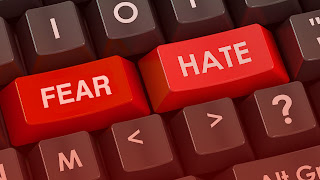Hate Inoculation
I have a bias. Well, I have many but I have one that may not be very popular. As a worldview I am skeptical and wary of Islam. I see a correlation between that ideology and heinous violence. This concerns me but there's something that keeps me from holding strongly to this belief and from converting this bias into adversarial action against Islam... and that is my personal interaction with Muslim people. Every single Muslim person I have ever met has been kind and humble. The Muslim students at my schools are bright and considerate and well, average. Sure they have problems, but they have them at the same rates as any other racial or religious demographic. My connections, albeit minimal, to the Islamic faith keep me from having a deep, unhealthy and unproductive bias, or at least it keeps that bias in check.
It makes it difficult to paint the near 2 billion Muslims in the world with the stroke of "terrorist" or "misogynist" when virtually every real world example I have in front of me contradicts that over-generalization. Interpersonal contact across groups is vital to inoculate ourselves against hate.
Why should we then shelter our kids from "the other"? I have some critical views of other groups as well but I lack the social connections to either confirm or challenge my bias. Scientology for example sounds so nutty to me but to be fair I don't know anyone that practices that faith so I am only seeing the negatively portrayed side of it. As it stands, I believe that, given the information that I do have I can safely say I want nothing to do with that ideology but I'm still open to meeting people who feel otherwise.
 |
| Image from https://www.motherjones.com/media/2016/09/fear-hate-anger-click-machine/ |
It's concerning to me that we have so many people ready and willing to comment on "the other" without having ever met someone of that group. If you have never had lunch with a gay person, or a Jewish person, or a Filipino person than do you really have a valid perspective on their identity/ideology?
Holocaust survivor and psychologist and researcher Ervin Staub grew up Jewish in Hungary. His family had a Christian caregiver that took care of him and his siblings. When Hungary enacted anti-Jewish laws, most citizens were turning in their Jewish neighbours out of either hate or fear, or most likely both. Ervin's caregiver took the enormous risk of hiding him and his family, while smuggling them bread. She put her own life at risk for helping this family. He argues that she did this, in contrast to her Christian counterparts who held nothing but contempt towards the Jewish people, because of her cross-group relationships.
Staub is one of the world's leading researchers on mass violence and genocide. Here are a few of his theories.
1) Violence evolves slowly.
2)Hatred grows in difficult life conditions. (ie. poverty, political unrest, etc.)
3) Bystanders matter. In conditions that tend to create violence, bystanders have to act early.
4) When people form close personal relationships to those across unfriendly groups, a positive barrier is created. In particular, intermarriage between groups correlates with less violence.
During the Rwandan genocide, tensions between Hutus and Tutsis were about as toxic as two groups could be, and to curb the intergroup hatred some Rwandans started a radio soap opera called Musekeweya that weaved into it the theories mentioned above, in order to teach prosocial, tolerant messages. In this widely popular soap opera there was an intermarriage between the two groups as well as other scenarios in which bystanders were able to change people's attitudes on prejudice. The result of this program was that more and more bystanders began stepping forward to promote peace between the groups, more Rwandans were becoming open to the idea of allowing their children to marry someone from the other group. The curious thing was that when studied, the show did not change anyone's personal opinion about ethnic tensions but it did lead to behavioural changes. The research demonstrated that people's behaviours are less tethered to their own personal beliefs and more to what they think the social norms are. In Rwanda, after Musekeweya, if you continued to hold on to your prejudice against Hutus or Tutsis you risked being a social outcast. Everyone still believed that tensions were there but very few were acting on those tensions in ways that would exacerbate the problem.
I hope for myself and my children that we can have meaningful interpersonal contact with people from different religions, races, linguistic and ethnic backgrounds, different sexual orientations and ideological leanings. Just like the Muslim people in my life have helped me judge that religion less we all need good people from diverse backgrounds to help us move humanity away from extremism and violence. Plus you just get to have a really interesting social circle.



Comments
Post a Comment